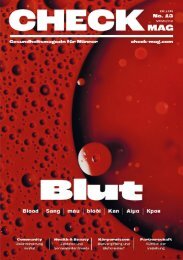CHECK Magazin - Gesundheitsmagazin für Männer No.15
Auf die wissenschaftlich nicht unbegründete Angst, dass der Planet Erde irgendwann für Menschen nicht mehr bewohnbar ist, reagieren die einen mit Widerstand, die anderen mit Ignoranz. Eine null Zukunft steht im Raum, dabei geht das Leben auf jeden Fall weiter. Nach dem Tod kompostieren wir und landen — über viele lange Umwege — vielleicht auf einem Salatteller, den eine (Leih-)Mutter während ihrer Schwangerschaft ißt. Der Punkt ist, dass hier niemand wirklich rauskommt. Warum also gestalten wir uns und den anderen die kurze Zeit nicht so angenehm und gesund wie möglich? Wir haben daher auf eine Sache geschaut, die wir alle gemeinsam haben: Wir altern, hoffentlich mit null Gewalt und Emissionen.
Auf die wissenschaftlich nicht unbegründete Angst, dass der Planet Erde irgendwann für Menschen nicht mehr bewohnbar ist, reagieren die einen mit Widerstand, die anderen mit Ignoranz. Eine null Zukunft steht im Raum, dabei geht das Leben auf jeden Fall weiter. Nach dem Tod kompostieren wir und landen — über viele lange Umwege — vielleicht auf einem Salatteller, den eine (Leih-)Mutter während ihrer Schwangerschaft ißt.
Der Punkt ist, dass hier niemand wirklich rauskommt. Warum also gestalten wir uns und den anderen die kurze Zeit nicht so angenehm und gesund wie möglich? Wir haben daher auf eine Sache geschaut, die wir alle gemeinsam haben: Wir altern, hoffentlich mit null Gewalt
und Emissionen.
Sie wollen auch ein ePaper? Erhöhen Sie die Reichweite Ihrer Titel.
YUMPU macht aus Druck-PDFs automatisch weboptimierte ePaper, die Google liebt.
<strong>CHECK</strong> MAG #15<br />
FIGHTING<br />
THE VICIOUS<br />
CIRCLE<br />
HOW COMPANIES CAN PROTECT<br />
THEIR EMPLOYEES FROM THE<br />
DANGERS OF ADDICTION.<br />
Addiction prevention in the workplace is a<br />
topic that is becoming increasingly important<br />
in today’s world. Substance addictions<br />
such as alcohol, drugs, nicotine or medication<br />
addiction can not only impair the health<br />
of those affected, but also have an impact<br />
on work performance and the working<br />
atmosphere. But behavioural addictions<br />
such as workaholism and excessive use of<br />
digital media should also be considered. It is<br />
important to raise awareness and sensitise<br />
people to the issue.<br />
What are the most common<br />
addictions in the workplace?<br />
Alcohol addiction and nicotine addiction<br />
are considered the most common substance-based<br />
addictions in the workplace.<br />
For example, 80% of workers drink alcohol,<br />
with around 10% of them even during<br />
working hours. 1 22% of employees smoke,<br />
about half of them also at work.<br />
Behavioural addictions that are highly<br />
relevant in the workplace context also<br />
include excessive consumption of digital<br />
media: 38% of adults who frequently surf<br />
the net also suffer from anxiety. As many as<br />
40% suffer from depressive symptoms, such<br />
as mood swings. Concentration problems<br />
(30%), exhaustion (36 %) and fatigue (34 %)<br />
were named as further stress factors. 2<br />
In the case of addiction to digital media<br />
consumption, the fear of missing out (FOMO)<br />
often plays an important role, which can lead<br />
to an excessive urge to constantly want to<br />
stay up to date. Another problem is addiction<br />
to work (workaholism), which manifests<br />
through compulsive working, perfectionism<br />
and working on days off.<br />
At what point is consumer behaviour<br />
considered an addiction?<br />
The World Health Organisation (WHO)<br />
describes addiction as the no longer<br />
controllable desire for a certain state of<br />
feeling, experience and consciousness. Some<br />
criteria are used to diagnose addiction,<br />
i.e. whether it is repeated or continued<br />
consumption despite knowledge of the<br />
harmful consequences, tolerance formation,<br />
withdrawal symptoms, and limiting dayto-day<br />
activities.<br />
What are the most common causes of<br />
addiction in the workplace?<br />
Many factors can be the cause for the<br />
development of an addiction in the workplace<br />
as well as in private life, such as excessive<br />
or insufficient demands, team conflicts,<br />
lack of recognition and appreciation, bullying<br />
and social isolation while in home office.<br />
But issues such as relationship problems,<br />
parenting, caring for relatives, lack of<br />
separation between private life and work,<br />
and financial worries can also contribute to<br />
an addiction.<br />
What are the effects of addictive<br />
behaviour in the workplace?<br />
In addition to the numerous health damages<br />
associated with addiction problems, the consequences<br />
can also be manifold in the workplace<br />
context. Increased days of absence<br />
due to e.g. health restrictions, increased<br />
conflicts in the team, reduced concentration<br />
1 DAK-Gesundheitsreport, 2019.<br />
2 Studie zur Digitalkompetenz, Techniker Krankenkasse<br />
2021.<br />
Addiction prevention34

















